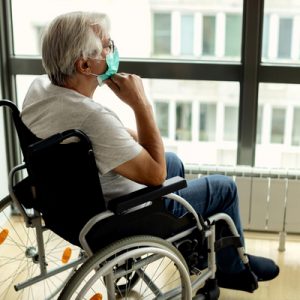Learn how states are combatting social isolation and loneliness in adults with disabilities during the COVID-19 pandemic
 Forty percent of adults with a debilitating disability or chronic condition report feelings of loneliness or being socially isolated. The significant risk factors for social isolation include living alone, mobility disabilities, major life transitions, and emerging health problems – all which become more prevalent in older age. The health risks associated with social isolation and loneliness are troubling, and include higher mortality rates, increased blood pressure, progression of Alzheimer’s Disease, depression, pain, fatigue, failing immune systems, and decreased restorative sleep.
Forty percent of adults with a debilitating disability or chronic condition report feelings of loneliness or being socially isolated. The significant risk factors for social isolation include living alone, mobility disabilities, major life transitions, and emerging health problems – all which become more prevalent in older age. The health risks associated with social isolation and loneliness are troubling, and include higher mortality rates, increased blood pressure, progression of Alzheimer’s Disease, depression, pain, fatigue, failing immune systems, and decreased restorative sleep.
In fact, the health risks of social isolation are equivalent to smoking 15 cigarettes a day. Seniors who report feeling lonely or socially isolated have a 45 percent greater risk of mortality.
COVID-19 has only exacerbated these concerns–particularly for adults with a disability. Social distancing guidelines have increased social isolation and loneliness for many adults with disabilities, as their caregivers and family members have been unable to visit. And social isolation and loneliness have intensified negative health outcomes due to closures of elective services and a shift to telemedicine–especially for adults whose disabilities prevent them from accessing online resources. For more than half of Americans with a disability, their disability makes accessing websites challenging. Adults living in rural communities may also have more difficult accessing internet resources, and a larger percentage of rural adults live with a disability than urban adults.
Some states are fighting back against loneliness in adults with disabilities. California and Nevada have developed programs to help older adults access services they need. Minnesota lists services for older adults in a Wiki updated daily. New York has identified key services. In addition, New York’s State Office for the Aging is sending 1,100 animatronic pets to aging adults after a study showed their effectiveness in combatting social isolation. And Michigan has launched a media campaign with information on reducing loneliness in adults with disabilities and older adults.